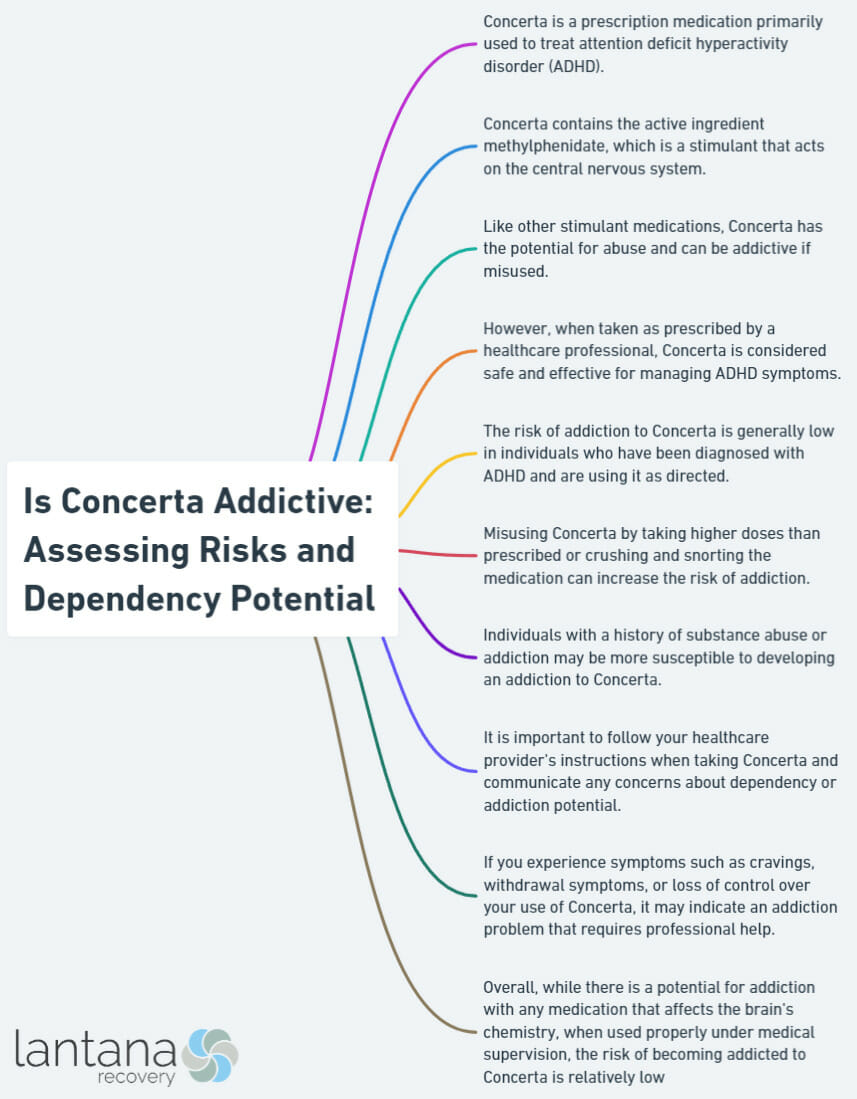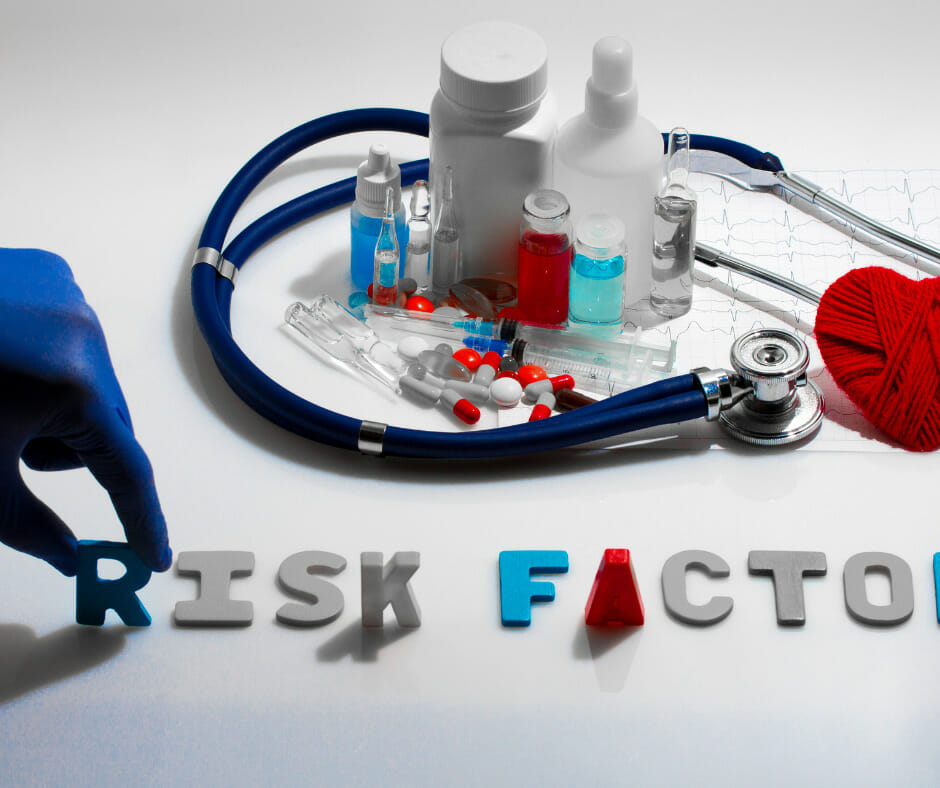Concerta is a commonly prescribed medication for the treatment of attention deficit hyperactivity disorder (ADHD). However, concerns have been raised about its potential for addiction and dependency. In this article, we will examine the risks and dependency potential associated with Concerta use.
To begin, let’s understand what Concerta is and how it works.
Concerta is a central nervous system stimulant that contains the active ingredient methylphenidate. It works by affecting certain chemicals in the brain and nerves that contribute to hyperactivity and impulse control. It is designed to be a long-acting medication, providing symptom relief for up to 12 hours.
The question then arises: Is Concerta addictive? Addiction and dependency are two separate but related concepts. Addiction refers to a psychological and compulsive need for a substance, while dependency involves the body becoming reliant on a drug to function normally.
Risks associated with Concerta use include the potential for psychological dependence, abuse and misuse of the medication, and withdrawal symptoms upon discontinuation. It is important to note that not everyone who takes Concerta will develop an addiction, but certain factors can increase the risk.
Factors that increase the risk of Concerta addiction include personal or family history of substance abuse, using Concerta for recreational purposes, taking higher doses than prescribed, and concurrent substance use.
To minimize the risk of Concerta addiction, it is essential to follow the prescribed dosage and instructions carefully, communicate openly with your healthcare provider, and regularly assess the treatment progress and effectiveness.

What is Concerta and How Does it Work?
Concerta is a prescription medication used to treat ADHD in children and adults. It is a stimulant drug containing methylphenidate. According to a study by Yale School of Medicine, methylphenidate works by increasing certain chemicals in the brain that regulate attention, impulse control, and hyperactivity.
When taken as directed, Concerta releases the medication gradually throughout the day, providing long-lasting relief from ADHD symptoms. This controlled release allows for consistent effects and helps individuals improve focus, reduce impulsivity, and manage hyperactivity.
It is important to use Concerta only under the guidance of a healthcare professional. The appropriate dosage will be determined based on individual needs, and potential side effects or interactions with other medications will be monitored.

Is Concerta Addictive?
Curious about the addictive properties of Concerta? Let’s delve into whether this medication poses a risk for dependency. We’ll explore the sub-sections that tackle the nuances of addiction and dependency, shedding light on the key factors to consider. Get ready to uncover the truth about Concerta and its potential impact on one’s well-being.
Understanding Addiction and Dependency
Understanding addiction and dependency is crucial when evaluating the potential risks of using Concerta. Both addiction and dependency can occur with Concerta use.
Concerta contains methylphenidate, a central nervous system stimulant that enhances the release and effectiveness of certain neurotransmitters in the brain, such as dopamine and norepinephrine. This can result in feelings of focus, alertness, and improved mood.
Studies have shown that long-term use of Concerta has the potential to lead to psychological dependence, where individuals may experience a strong craving or compulsion to continue using the medication, even when it is no longer medically necessary. “Methylphenidate (MPH) has a long history of being an effective medication for attention deficit/hyperactivity disorder (ADHD).” (Characteristics and Motives of College Students Who Engage in Nonmedical Use of Methylphenidate, DuPont et al., 2008)
However, it’s important to note that not everyone who uses Concerta will develop psychological dependence.
Misuse and abuse of Concerta can significantly increase the risk of addiction. Some individuals may use Concerta without a prescription, take higher doses than prescribed, or use it recreationally. These behaviors greatly heighten the likelihood of addiction.
Abrupt discontinuation of Concerta after prolonged use can result in withdrawal symptoms, including fatigue, depression, irritability, and cravings for the medication. Gradually tapering off Concerta under the guidance of a healthcare provider can help minimize the risk of withdrawal symptoms.
Having a solid understanding of addiction and dependency in relation to Concerta is pivotal for making informed decisions about its use. It is essential to follow prescribed dosages and instructions, maintain open communication with healthcare providers, and regularly assess treatment progress and effectiveness in order to mitigate the risk of addiction.
Risks Associated with Concerta Use
Let’s delve into the potential for psychological dependence, as well as the risks of abuse and misuse of Concerta. We’ll also explore the withdrawal symptoms that can occur. Brace yourself as we uncover the dark side of Concerta and shed light on the potential dangers lurking beneath its seemingly innocent facade. Prepare to be shocked by the realities and risks associated with this widely used medication.

Potential for Psychological Dependence
Psychological dependence is a significant concern when it comes to the use of Concerta. This medication, which is typically prescribed for ADHD, has the potential to create a reliance on it at a psychological level.
One reason for this is that Concerta directly impacts the brain. It has the ability to alter the levels of specific brain chemicals, including dopamine. This neurotransmitter is involved in feelings of pleasure, reward, and motivation. As Concerta stimulates the release of dopamine, it can result in a sense of euphoria or a heightened focus. These effects contribute to the development of psychological dependence.
Another aspect of psychological dependence on Concerta is the presence of strong drug cravings. Individuals who become psychologically dependent on Concerta may have intense cravings for the medication, leading them to continually take it in order to achieve the desired effects or to avoid withdrawal symptoms. These cravings can create a challenging and hard-to-break cycle of dependence.
It is important to note that certain individuals may be more vulnerable to developing psychological dependence on Concerta. Those with a history of substance abuse or individuals who are seeking recreational effects may be particularly at risk. Misusing Concerta, such as taking higher doses than prescribed or using it for non-medical purposes, can significantly increase the likelihood of becoming dependent on it.
When discontinuing Concerta after prolonged use, individuals may experience withdrawal symptoms. These symptoms can include depression, fatigue, irritability, and difficulty concentrating. These withdrawal symptoms serve as a reminder of the potential for psychological dependence.
To mitigate the risk of psychological dependence, it is crucial for healthcare providers and patients to closely monitor Concerta use. Regular assessments of treatment progress and maintaining open communication with healthcare providers can help in identifying signs of dependency and ensuring appropriate management.
Abuse and Misuse of Concerta
Abuse and misuse of Concerta can have serious consequences. It is crucial to understand the following important facts:
- Using Concerta without a prescription is considered abuse. Therefore, it is essential to only take Concerta if it has been prescribed by a healthcare professional.
- Some individuals may misuse Concerta for non-medical purposes, such as enhancing focus or cognitive performance.
- Taking doses of Concerta higher than what is prescribed is a form of misuse. It is important to always follow the dosage instructions provided by your healthcare provider.
- It is crucial to be aware that abuse and misuse of Concerta can lead to psychological dependence.
- Combining Concerta with other drugs or alcohol increases the risk of abuse and harm.
To ensure safe usage, it is necessary to use Concerta responsibly and under the guidance of a healthcare professional. It is also important to have open communication with your healthcare provider if you have any concerns or questions regarding your medication. Regular assessments of your treatment progress can help minimize the risk of misuse and ensure that Concerta is being used appropriately. Understanding the potential risks associated with Concerta and taking necessary precautions is essential in order to maintain its benefits while avoiding harm.
Fact,
Withdrawal Symptoms
Withdrawal symptoms can occur when a person abruptly stops taking Concerta after regular use. The intensity and duration of these withdrawal symptoms, including fatigue, depression, increased appetite, trouble concentrating, and irritability, can vary based on factors such as dosage, duration of use, and the body’s response to the medication. It is important to note that these withdrawal symptoms can be uncomfortable but are typically temporary.
To minimize the intensity of withdrawal symptoms, it is recommended to gradually reduce the dosage of Concerta under the guidance of a healthcare provider. It is advisable for individuals considering discontinuing Concerta to consult with their healthcare provider to develop an appropriate tapering plan for safely managing any potential withdrawal symptoms.

Factors That Increase the Risk of Concerta Addiction
Uncovering potential risks associated with Concerta use. From personal/family history of substance abuse to recreational use and higher than prescribed doses, we’ll explore the factors that can contribute to the development of dependency. Discover how concurrent substance use can further heighten the risk, backed by relevant data and insights on Concerta addiction. Stay informed and understand the crucial elements that can impact the likelihood of addiction.
Personal or Family History of Substance Abuse
Individuals with a personal or family history of substance abuse have an increased risk of developing addiction to Concerta. It is crucial to be aware of this risk and take necessary precautions. It is also important to note that having a personal or family history of substance abuse indicates a genetic predisposition to addiction. People who come from families with a history of substance abuse might be more susceptible to developing an addiction to Concerta.
Moreover, growing up in an environment where substance abuse is prevalent can also increase the risk of addiction. Therefore, it is essential to recognize and address any underlying environmental factors that may contribute to the likelihood of developing addiction.
Additionally, individuals with a personal or family history of substance abuse may have a heightened sensitivity to stimulant medications like Concerta. This increased sensitivity can further elevate the risk of dependency. To mitigate this risk, it is highly recommended to discuss your personal or family history of substance abuse with your healthcare provider. By informing them, they can provide guidance and closely monitor your use of Concerta, thereby minimizing the risk of addiction.
Remember, staying open and honest with your healthcare provider about your personal or family history of substance abuse is crucial. This will assist them in tailoring a treatment plan that takes into account your individual risk factors and reduces the potential for addiction to Concerta.
Using Concerta for Recreational Purposes
Using Concerta for recreational purposes can have serious health risks and potential dangers. Misusing Concerta without a legitimate medical need can lead to adverse effects on the body, including increased heart rate, elevated blood pressure, and even overdose. Recreational use of Concerta can also cultivate a psychological dependence on the drug and lead to addiction.
There are various health problems associated with misusing Concerta for recreational purposes, such as cardiovascular issues, psychiatric symptoms, weight loss, and disturbances in sleep patterns. It is important to remember that Concerta is a prescription medication and should only be used for its intended purpose under medical supervision. Using Concerta recreationally is not worth the risks involved.
Individuals who have used Concerta for recreational purposes have experienced health complications, including heart problems, addiction, and psychological distress. These cases highlight the dangers of using Concerta without a legitimate medical need and emphasize the importance of responsible and safe medication use.
Fact: According to the recent review of a population-based study, the prevalence of nonmedical prescription stimulant use in the past year varied from 5% to 9% among adolescents and 5% to 35% in college-age adults.
Taking Higher Doses than Prescribed
Taking higher doses of Concerta can have serious consequences and increase the risk of addiction. It is important to follow the prescribed dosage and not exceed it.
Higher doses of Concerta can increase the risk of side effects such as nervousness, restlessness, increased heart rate, and insomnia. Concerta is a powerful medication and should only be taken as prescribed by a healthcare provider.
Taking higher doses of Concerta may diminish the intended therapeutic effects. The medication is designed to provide a controlled release of the active ingredient, methylphenidate, throughout the day. Higher doses can disrupt this controlled release and lead to inconsistent effects.
Taking higher doses of Concerta than prescribed can increase the risk of dependence and addiction. The medication helps improve focus and reduce hyperactivity by affecting certain chemicals in the brain. Misusing the medication by taking higher doses can lead to psychological dependence.
It is important to openly communicate with your healthcare provider about any concerns or difficulties you may have with your current dosage. They can provide guidance and make adjustments if necessary.
Remember that the goal of Concerta treatment is to find the right dosage that effectively manages symptoms while minimizing the risk of side effects and dependence. Taking higher doses than prescribed can negate these benefits and pose potential risks to your well-being.
Always follow the instructions provided by your healthcare provider and never take higher doses than prescribed. Your healthcare provider is there to support you in finding the most effective treatment plan for your specific needs.
Concurrent Substance Use
Concurrent substance use, also known as the simultaneous use of multiple substances, can pose significant risks and negative effects. When using Concerta, a medication commonly prescribed for ADHD, engaging in concurrent substance use can greatly increase the risk of addiction and harmful outcomes.
- Increased risk: The act of using multiple substances while taking Concerta elevates the chances of developing an addiction. This combination can magnify the dependency on Concerta, making it more challenging to stop using.
- Heightened effects: Concurrent substance use can amplify the effects of Concerta, resulting in heightened stimulation, euphoria, or sedation. These intensified effects may make Concerta more appealing for recreational purposes and significantly increase the likelihood of misuse.
- Health complications: Mixing Concerta with other substances can lead to severe health complications. For example, combining Concerta with alcohol can strain the cardiovascular system, raise blood pressure, and impair judgment, posing significant risks to the individual’s well-being.
- Decreased effectiveness: Engaging in concurrent substance use can hinder Concerta’s effectiveness in treating the symptoms of ADHD. Other substances may counteract the desired therapeutic effects, ultimately reducing the overall benefits derived from Concerta.
- Potential for overdose: Concurrent substance use significantly raises the risk of overdose as the combination of substances can overwhelm the body’s ability to metabolize them. This can have severe consequences for both physical and mental health, posing a grave threat to the individual’s well-being.
To minimize the risk of Concerta addiction and adverse outcomes, it is crucial to avoid engaging in concurrent substance use. It is essential to inform healthcare providers about any substances being used simultaneously to ensure appropriate treatment planning and monitoring. Following the prescribed dosage and instructions and maintaining open communication with healthcare providers can create a safer and more effective treatment experience overall.

How to Minimize the Risk of Concerta Addiction
When it comes to minimizing the risk of Concerta addiction, there are crucial steps you can take. From following the prescribed dosage to openly communicating with your healthcare provider, and regularly assessing the progress of your treatment, these strategies will help protect against dependency. By understanding these measures, you can make informed decisions about your Concerta usage and prioritize your overall well-being. Let’s dive into these important considerations for minimizing the risk of Concerta addiction.
Follow Prescribed Dosage and Instructions
Following the prescribed dosage and instructions is crucial when taking Concerta to reduce the risk of addiction and ensure safe and effective treatment.
- It is important to read the medication guide provided by your healthcare provider or pharmacist thoroughly before taking Concerta to follow the prescribed dosage and instructions.
- To ensure safe and effective treatment, it is essential to take Concerta exactly as prescribed by your healthcare provider. It is important not to exceed or reduce the recommended dose.
- Concerta should be taken once a day in the morning, with or without food, as instructed. It is advisable to avoid taking it in the evening to prevent sleep disturbances and to adhere to the prescribed dosage and instructions.
- When taking Concerta, it is crucial to swallow the tablet whole with water. It is not recommended to crush, chew, or divide the tablet, as this can release excessive medication. Following this guidance is important to ensure safe and effective treatment.
- It is important not to stop taking Concerta without consulting your healthcare provider. Suddenly discontinuing the medication can lead to withdrawal symptoms. It is crucial to follow the prescribed dosage and instructions.
- If you accidentally miss a dose of Concerta, it is important to take it as soon as you remember. However, if it is close to your next scheduled dose, it is advised to skip the missed dose and continue with your regular dosing, in accordance with the prescribed dosage and instructions.
- Before consuming alcohol or other substances that may interact with Concerta, it is important to consult your healthcare provider. They can provide guidance and ensure safe and effective treatment in line with the prescribed dosage and instructions.
- Regular communication with your healthcare provider regarding the effectiveness of Concerta, addressing the signs of low Adderall dose, and any experienced side effects is crucial. This will help them determine the appropriate dosage and treatment plan for you, in accordance with the prescribed dosage and instructions.
- It is recommended to store Concerta at room temperature, away from moisture and heat, to ensure its effectiveness. Additionally, keeping it out of reach of children and pets is important for their safety.
By following the prescribed dosage and instructions for Concerta, you can ensure safe and effective treatment while minimizing the risk of addiction.
Communicate Openly with Your Healthcare Provider
When taking Concerta, it is important to communicate openly with your healthcare provider. Share any changes in symptoms, discussing any side effects you may be experiencing, and don’t hesitate to ask questions. It is also important to attend follow-up appointments to monitor your progress and take a proactive approach to ensure the best care possible.
-
Share changes in symptoms: Inform your healthcare provider of any changes in symptoms while taking Concerta. This will help them determine if adjustments to your dosage or treatment plan are necessary.
-
Discuss side effects: If you experience side effects such as insomnia or loss of appetite, make sure to inform your healthcare provider. They can offer guidance on managing these side effects or make adjustments to your treatment plan as needed.
-
Ask questions: Feel free to ask your healthcare provider any questions or express any concerns you may have. They are there to provide necessary information and address any concerns you may have.
-
Attend follow-up appointments: Regularly attending follow-up appointments is crucial to monitor your progress and assess the effectiveness of your treatment. Use these visits as an opportunity to communicate any changes or concerns.
-
Be proactive: Take an active role in your treatment by openly communicating with your healthcare provider. This will promote a collaborative approach to your healthcare and allow for any necessary adjustments to be made.
Regularly Assess Treatment Progress and Effectiveness
Regularly assess treatment progress and effectiveness when using Concerta to ensure optimal results and make necessary adjustments. Follow these steps:
- Keep a treatment journal: Document experiences and observations regularly. Note changes in symptoms, mood, concentration, and overall well-being.
- Track improvements and challenges: List specific symptoms or behaviors Concerta is intended to address. Continuously evaluate improvement or new challenges.
- Communicate with healthcare provider: Share the treatment journal and discuss observations. Healthcare providers can offer insights and recommendations.
- Discuss side effects: If experiencing any side effects from Concerta, discuss with healthcare provider. Evaluate benefits versus side effects and explore alternative treatments if needed.
- Regularly review treatment plan: Schedule regular appointments with healthcare provider to regularly assess treatment progress and effectiveness. This allows for ongoing assessment and adjustment of medication dosage or treatment approach.
Staying actively involved in monitoring progress and working collaboratively with healthcare providers is crucial for regularly assessing treatment progress and effectiveness with Concerta. Remember that medication response varies, so regular assessment and open communication are key to maximizing treatment effectiveness.
Can Adderall be linked to the onset of other psychological disorders? Read our article on Adderall and Schizophrenia? Read our article to find out!
Frequently Asked Questions
Is Concerta addictive?
Yes, Concerta can be addictive due to its stimulating effects on the central nervous system and its ability to increase dopamine levels in the brain.
What are some street names for Concerta?
Concerta is often referred to by street names such as Kibbles & Bits and Kiddie Coke.
What are the risks of using extended-release Concerta tablets?
Extended-release Concerta tablets have a higher potential for abuse and can be especially dangerous if the formula is modified. However, you can always seek treatment for Concerta dependency at any outpatient drug rehab.
Is Concerta the primary drug of choice for individuals with ADHD?
Concerta is commonly prescribed as a treatment for individuals with ADHD, as it helps to improve attention span and reduce hyperactivity. However, it can also be found on the recreational drug market.
What are the health benefits of Concerta?
Concerta has health benefits for individuals with ADHD, as it helps to control symptoms of the condition. However, it does not have health benefits for those without ADHD.
What are the treatment options for Concerta addiction?
Treatment options for Concerta addiction include outpatient, intensive outpatient, residential, and inpatient programs. Finding the right treatment plan is important for overcoming Concerta addiction.









